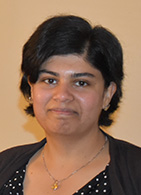Pavithra Prabhakar to lead on NASA grant to design certifiable, intelligent aerospace control systems
MANHATTAN — With an immediate need for intelligent and robust aircraft controllers resilient to mid-air disturbances such as wind, turbulence and sensor noise, NASA has provided a $750,000 grant to a team of Kansas researchers for development of certified, artificial intelligence-based controllers for aerospace systems.
Pavithra Prabhakar, associate professor and Peggy and Gary Edwards chair in engineering in the computer science department, will lead Kansas State University on the project "Evolving and Certifiable Autopilot for Unmanned Aerial Systems, Phase II."
Collaborators on the NASA-supported research are Willem Anemaat, president of the DARcorporation, an aeronautical engineering firm in Lawrence; and Shawn Keshmiri and Heechul Yun, faculty members at the University of Kansas.
This team will develop machine learning-based controllers to improve the performance of traditional controllers in fixed-wing, unmanned aerial systems by adapting to stimuli in the environment.
"Certifying these machine learning-based controllers is a major challenge due to their complexity," Prabhakar said. "We will explore a novel control architecture, combining machine learning-based and traditional controllers, that provides both safety and performance guarantees."
As part of the project, the Kansas State University team will design formal techniques to verify the correctness of the high-performance, machine learning-based controllers. The faculty from KU will use actual unmanned aerial systems to validate the performance of novel controllers in real flight-test environments. Both developments will open the pathway for high-confidence, artificial intelligence-based flight controllers.
"The project will be a stepping stone toward the design and deployment of next-generation aircraft controllers that can intelligently handle adversities in mid-air," Prabhakar said, "and will involve both undergraduate and graduate students in performing research into aerospace control systems."

